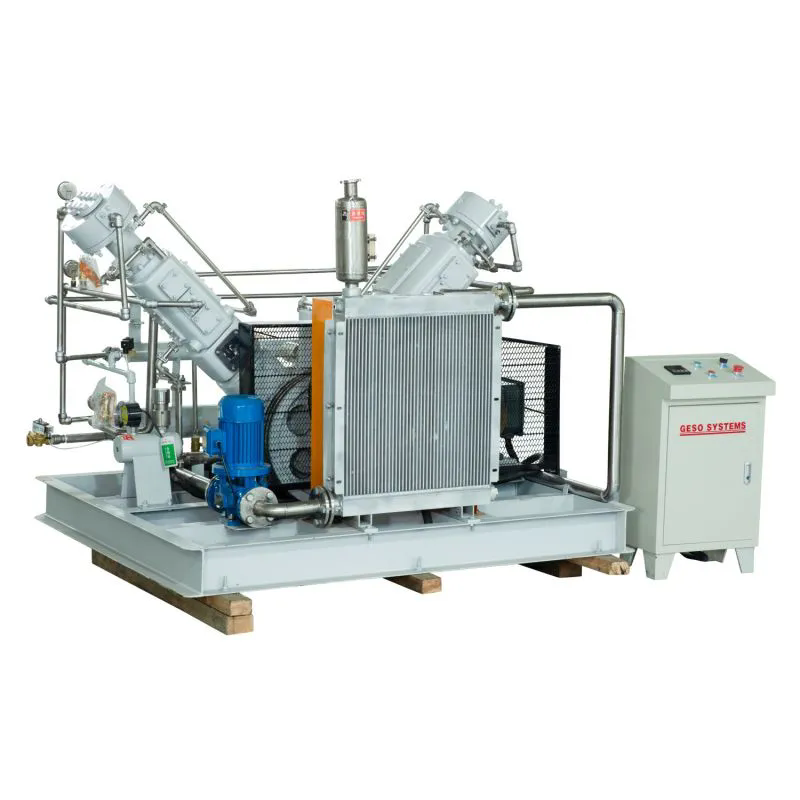A Comprehensive Guide to Diesel Portable Air Compressors: Power, Efficiency, and Versatility
2024-09-13
Diesel portable air compressors are an indispensable tool in a wide variety of industries, providing a reliable and consistent source of compressed air for numerous applications. Whether it's construction, mining, agriculture, or any remote worksite, these compressors are renowned for their portability, durability, and power. In this blog, we'll explore the key features, benefits, and applications of diesel portable air compressors, along with tips on selecting the right model for your needs.
What is a Diesel Portable Air Compressor?
A diesel portable air compressor is a machine that uses a diesel engine to power an air compressor. The compressor compresses air, which can then be used to power pneumatic tools or other machinery that rely on compressed air. The portable design allows these compressors to be easily transported to different worksites, making them highly convenient for mobile operations.
Key Features of Diesel Portable Air Compressors
1. Powerful Performance: Diesel engines are known for their high torque and power output, making diesel air compressors capable of generating large volumes of compressed air. This makes them suitable for heavy-duty applications such as drilling, sandblasting, and powering multiple tools simultaneously.
2. Portability: The design of these compressors includes rugged wheels and frames, allowing them to be easily moved around job sites or transported to remote locations. They are ideal for outdoor and off-grid applications where electric power may not be available.
3. Fuel Efficiency: Diesel engines are more fuel-efficient than gasoline engines, providing longer run times on a single tank of fuel. This reduces downtime for refueling and improves overall productivity, especially in environments where continuous operation is required.
4. Durability: Diesel engines are built to withstand harsh conditions, making diesel air compressors suitable for rough environments like construction sites, mining operations, and industrial settings. The robust construction ensures longevity, even in demanding outdoor conditions.
5. Versatility: Diesel portable air compressors are compatible with a wide range of pneumatic tools, including jackhammers, drills, impact wrenches, and sandblasters. This versatility makes them a vital resource across many industries.
Advantages of Diesel Portable Air Compressors
1. No Dependency on Electricity: One of the most significant advantages of diesel portable air compressors is that they don't require an electrical power source. This makes them ideal for remote locations or areas with unreliable power supplies, ensuring uninterrupted operations.
2. High Air Output: Diesel air compressors typically provide higher air output compared to their electric counterparts, making them suitable for large-scale or industrial applications that require sustained, high-pressure air.
3. Low Maintenance: Diesel engines are built for durability and long-term use. With proper maintenance, they can run for extended periods with minimal downtime, making them a cost-effective option over the long run.
4. Safety: Since they don’t rely on electricity, diesel air compressors eliminate the risks associated with electrical failures, such as short circuits or power outages. They are also safer in environments where flammable materials are present, as diesel engines pose less of a fire hazard compared to gasoline engines.
5. Extended Run Times: Diesel portable air compressors often come equipped with large fuel tanks, allowing for extended run times without frequent refueling. This increases efficiency on long projects, especially in remote locations.
Common Applications of Diesel Portable Air Compressors
1. Construction Sites: Diesel portable air compressors are commonly used on construction sites to power a wide range of pneumatic tools, such as nail guns, jackhammers, and grinders. Their mobility and power make them essential for building infrastructure in areas where electricity is limited.
2. Mining Operations: In the mining industry, compressed air is used for drilling, blasting, and other operations. Diesel portable air compressors offer the reliability needed in rugged mining environments, where electric power may be inaccessible.
3. Agriculture: Farmers and agricultural workers rely on diesel portable air compressors to operate irrigation systems, power pneumatic tools, and maintain machinery. The ability to move these compressors across vast farmlands is a major benefit for agricultural tasks.
4. Oil and Gas Industry: In the oil and gas sector, diesel air compressors are used for pipeline maintenance, drilling, and other critical applications. Their ability to function in harsh and remote locations makes them a valuable asset in this industry.
5. Emergency Services: Diesel portable air compressors are also used by emergency services for tasks like filling air tanks for firefighters, powering rescue tools, and operating equipment in disaster recovery operations.
How to Choose the Right Diesel Portable Air Compressor
When selecting a diesel portable air compressor, there are several key factors to consider:
1. Air Capacity (CFM): CFM (Cubic Feet per Minute) measures the amount of compressed air the compressor can produce. Ensure the model you choose has enough capacity to meet the air demands of your tools and applications.
2. Pressure Rating (PSI): Check the pressure rating to ensure the compressor can generate sufficient pressure for the tasks you intend to perform. Different tools require different PSI levels, so it's important to match the compressor's output with your requirements.
3. Fuel Efficiency: Diesel compressors vary in fuel consumption. Look for models that offer optimal fuel efficiency to reduce operating costs, especially for long-term or high-demand projects.
4. Portability and Weight: While most diesel air compressors are designed for portability, consider the weight and size, particularly if you need to transport the compressor frequently. Some models offer better mobility features, such as enhanced wheels or lifting points.
5. Noise Levels: Diesel engines can be noisy, which might be a concern in certain environments. Look for models with sound-reducing technology if noise is a factor at your job site.
6. Durability: If you’re working in harsh environments, ensure the compressor is built from sturdy materials that can withstand tough conditions. Features like weatherproofing and corrosion-resistant components are a plus.
Maintenance Tips for Diesel Portable Air Compressors
To ensure the longevity and optimal performance of your diesel portable air compressor, regular maintenance is essential. Here are some key maintenance tips:
- Check Oil Levels: Diesel engines require regular oil checks and changes. Monitor oil levels and ensure the engine is well-lubricated to prevent wear and tear.
- Inspect Air Filters: Clean or replace air filters regularly to prevent dirt and debris from entering the engine or compressor.
- Monitor Fuel Levels: Ensure there’s sufficient fuel before starting operations, and drain any condensation from the fuel tank to prevent water damage.
- Regular Servicing: Schedule routine servicing for your compressor to catch any potential issues early and keep the engine running smoothly.
Conclusion
Diesel portable air compressors offer a powerful, efficient, and versatile solution for industries that require reliable compressed air in remote or challenging environments. With their robust construction, high air output, and fuel efficiency, they are a valuable investment for businesses that rely on heavy-duty pneumatic tools and equipment. By choosing the right model and maintaining it properly, you can maximize the performance and lifespan of your diesel portable air compressor, ensuring it remains a trusted asset for years to come.



